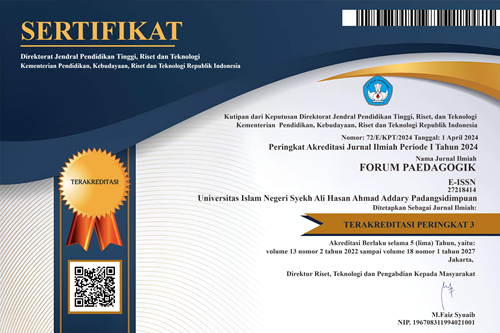FACTORS FOR CURRICULUM IMPLEMENTATION SUCCESS: FOCUS ON PAI LEARNING IN SCHOOLS
The curriculum has a central role in the world of education, in its journey, it always changes to adapt to the current developments in the form of a written and systematic plan. The hope is that it can lead students to become complete human beings. Even though in reality not all students can achieve these goals, it needs to be explored in detail regarding what factors can encourage the curriculum to be implemented to students properly and successfully as a whole. So the purpose of this study is to describe the Success Factors for Curriculum Implementation with a focus on the Islamic Religious Education learning curriculum in schools. The method used in this study is qualitative with a literature study approach, and the data analysis used is descriptive content analysis so that it is relevant to the research topic and then finally concluded. The results of this study indicate that the factors for successful implementation of the curriculum are good and mature planning, the involvement of various parties (principals, teachers, students, and the community) in the running of the curriculum, and monitoring and evaluation as well as feedback. While specifically in PAI subjects the success factor is dominated by teachers, students and the environment.
Keywords : Success Factors; Implementation; Curriculum
Arifai, A. (2017). Optimalisasi Penerapan Kurikulum 2013. Raudhah Proud to Be Professionals: Jurnal Tarbiyah Islamiyah, 2(1), 39–48. https://doi.org/https://doi.org/10.48094/raudhah.v2i1.13
Azhar. (2020). Perkembangan Kurikulum di Indonesia dari Klasik ke Modern. Fitrah: Internasiotional Islamic Education Journal, 2(2), 104–124. https://doi.org/https://doi.org/10.22373/fitrah.v2i2.784
Darmalaksana, W. (2020). Metode Penelitian Kualitatif Studi Pustaka dan Studi Lapangan.
Dhomiri, A., Junedi, & Nursikin, M. (2023). Konsep Dasar dan Peranan serta Fungsi Kurikulum dalam Pendidikan. Khatulistiwa: Jurnal Pendidikan Dan Sosial Humaniora, 3(1), 118–128. https://doi.org/https://doi.org/10.55606/khatulistiwa.v3i1.972
Elihami, & Syahid, A. (2018). Penerapan Pembelajaran Pendidikan Agama Islam dalam Membentuk Karakter Pribadi yang Islami. Edumaspul: Jurnal Pendidikan, 2(1), 79–96. https://doi.org/https://doi.org/10.33487/edumaspul.v2i1.17
Falah, A. (2015). Studi Analisis Aspek-aspek Keberhasilan Pembelajaran Pendidikan Agama Islam di SDN 01 Karangmalang Gebog Kudus. Elementary: Islamic Teacher Journal, 3(1), 171–195. https://doi.org/http://dx.doi.org/10.21043/elementary.v3i1.1449
Grant, J. (2010). Principles of Curriculum Desgin. Understanding Medical Education: Evidence, Theory, and Practice, 1–15. https://doi.org/https://doi.org/10.1002/9781444320282.ch1
Grant, J. (2018). Principles of Curriculum Design. Understanding Medical Education: Evidence, Theory, and Practice, and Third Edition, 71–88. https://doi.org/https://doi.org/10.1002/9781119373780.ch5
Hamalik, O. (2010). Manajemen Pengembangan Kurikulum. PT REMAJA ROSDAKARYA.
Hatim, M. (2018). Kurikulum Pendidikan Agama Islam di Sekolah Umum. El-Hikmah: Jurnal Kajian Dan Penelitian Pendidikan Islam, 12(2), 140–163. https://doi.org/https://doi.org/10.20414/elhikmah.v12i2.265
Hernawan, A. H., & Andriyani, D. (2011). Hakikat Kurikulum dan Pembelajaran. In Pengembangan Kurikulum dan Pembelajaran EKOP. Universitas Terbuka.
Hidayat, R., Siswanto, A., & Bangun, B. N. (2017). Dinamika Perkembangan Kurikulum di Indonesia Rentjana Pembelajaran 1947 hingga Kurikulum 2013. Labsos UNJ.
Insani, F. D. (2019). Sejarah Perkembangan Kurikulum di Indonesia Sejak Awal Kemerdekaan Hingga Saat Ini. As-Salam: Jurnal Studi Hukum Islam Dan Pendidikan, 8(1), 43–64. https://doi.org/https://doi.org/10.51226/assalam.v8i1.132
Jannah, R. (2017). Upaya Meningkatkan Keberhasilan Pembelajaran Pendidikan Agama Islam. Madrosatuna: Journal of Islamic Elementary School, 1(1), 47–58. https://doi.org/10.21070/madrosatuna.v1i1.1211
Maimunah. (2014). Sumber Daya Pendukung Keberhasilan Pelaksanaan Kurikulum. Al-Afkar: Jurnal Ilmu Keislaman Dan Peradaban, 2(2), 5–15. https://doi.org/https://doi.org/10.28944/afkar.v2i2.96
Mitchell, B. (2016). Curriculum Construction and Implementation. International Journal of Liberal Arts and Social Science, 4(4), 45–56. www.ijlass.org
Mulenga, I. M. (2018). Conceptualization and Definition of a Curriculum. Journal of Lexicography and Terminology, 2(2), 1–23.
Mulyadi. (2015). Implementasi kebijakan. Balai Pustaka.
Munthe, M. (2020). Faktor-faktor yang Mempengaruhi Keberhasilan Kurikulum Ditinjau dari Sudut Manajerial. Majalah Ilmiah Warta Dharmawangsa, 14(2), 269–279. https://doi.org/https://doi.org/10.46576/wdw.v14i2.626
Nurhuda, A., & Prananingrum, A. V. (2022). Empowerment of Children in Dawung, Matesih, Karanganyar Village Through Educational Classes in the Time of Covid-19. Journal of Educational Analytics, 1(1), 61–70.
Nurhuda, A., & Putri, Y. (2023). The Urgence of Teacher’s Example for Student Education in School. Journal Corner of Education, Linguistics, and Literature, 2(3), 250–257.
Nurhuda, A., & Setyaningtyas, N. A. (2022). Implementasi Pembelajaran Ilmu Hadist di MAN 1 Boyolali saat Pandemi ( The Implementation of Hadith Science Learning in Man 1 Boyolali During the Pandemic ). 1(2), 63–76.
Peraturan Pemerintah Nomor 55 Tahun 2007 tentang Pendidikan Agama dan Pendidikan Keagamaan, Pub. L. No. 55, Sekretariat Negara Republik Indonesia (2007).
Rosyada, D. (2004). Paradigma Pendidikan Demokratis, Sebuah Model Pelibatan Masyaraat dalam Penyelenggaraan Pendidikan. Prenada Media Group.
Sanjaya, W. (2005). Pembelajaran dalam Implementasi Kurikilum Berbasis Kompetensi. Prenada Media Group.
Sanjaya, W. (2011). Kurikulum dan pembelajaran: teori dan praktik pengembangan kurikulum tingkat satuan pendidikan. Kencana Prenada Media Group.
Salabi, A. S. (2020). Efektivitas dalam Implementasi Kurikulum Sekolah. Education Achievment: Journal of Science and Research, 1(1), 1–13. https://doi.org/https://doi.org/10.51178/jsr.v1i1.177
Salim, & Syahrum. (2012). Metodologi Penelitian Kualitatif. Ciptapustaka Media.
Sudirman. (2019). Strategi Implementasi Kurikulum: Suatu Kajian Perspektif Teori di Sekolah Dasar. Adara: Jurnal Manajemen Pendidikan Islam, 9(2), 936–951. https://doi.org/http://dx.doi.org/10.35673/ajmpi.v9i2.428
Tilley, S., & Taylor, L. (2013). Understanding curriculum as lived: teaching for social justice and equity goals. Race Ethnicity and Education, 16(3), 406–429. https://doi.org/10.1080/13613324.2011.645565
Usman, N. (2002). Konteks Implementasi Berbasis Kurikulum. Raja Grafindo.
Zed, M. (2008). Metode Penelitian Kepustakaan. Yayasan Obor Indonesia.
 Copyright (c) 2023 Abid Nurhuda, Nur Aini Setyaningtyas, Ali Anhar Syi’bul Huda, Arif Al Anang, Nur Muhammad Lathif
Copyright (c) 2023 Abid Nurhuda, Nur Aini Setyaningtyas, Ali Anhar Syi’bul Huda, Arif Al Anang, Nur Muhammad Lathif

This work is licensed under a Creative Commons Attribution-ShareAlike 4.0 International License.











